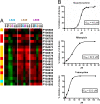A combined transcriptome and proteome survey of malaria parasite liver stages
- PMID: 18172196
- PMCID: PMC2224207
- DOI: 10.1073/pnas.0710780104
A combined transcriptome and proteome survey of malaria parasite liver stages
Abstract
For 50 years since their discovery, the malaria parasite liver stages (LS) have been difficult to analyze, impeding their utilization as a critical target for antiinfection vaccines and drugs. We have undertaken a comprehensive transcriptome analysis in combination with a proteomic survey of LS. Green fluorescent protein-tagged Plasmodium yoelii (PyGFP) was used to efficiently isolate LS-infected hepatocytes from the rodent host. Genome-wide LS gene expression was profiled and compared with other parasite life cycle stages. The analysis revealed approximately 2,000 genes active during LS development, and proteomic analysis identified 816 proteins. A subset of proteins appeared to be expressed in LS only. The data revealed exported parasite proteins and LS metabolic pathways including expression of FASII pathway enzymes. The FASII inhibitor hexachlorophene and the antibiotics, tetracycline and rifampicin, that target the apicoplast inhibited LS development, identifying FASII and other pathways localized in the apicoplast as potential drug targets to prevent malaria infection.
Conflict of interest statement
Conflict of interest statement: S.H.I.K. is a coinventor on two patent applications relevant to this work (Genetically attenuated malaria vaccines, patent no. WO 2005/063991; and
Figures




References
-
- Greenwood B. Malaria vaccines Evaluation and implementation. Acta Trop. 2005;95:298–304. - PubMed
-
- Miller LH, Baruch DI, Marsh K, Doumbo OK. The pathogenic basis of malaria. Nature. 2002;415:673–679. - PubMed
-
- Hoffman SL, Doolan DL. Malaria vaccines targeting infected hepatocytes. Nat Med. 2000;6:1218–1219. - PubMed
-
- Alonso PL, et al. Duration of protection with RTS,S/AS02A malaria vaccine in prevention of Plasmodium falciparum disease in Mozambican children: Single-blind extended follow-up of a randomised controlled trial. Lancet. 2005;366:2012–2018. - PubMed
Publication types
MeSH terms
Substances
Associated data
- Actions
LinkOut - more resources
Full Text Sources
Other Literature Sources
Medical
Molecular Biology Databases

